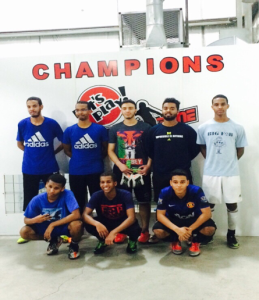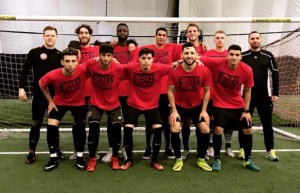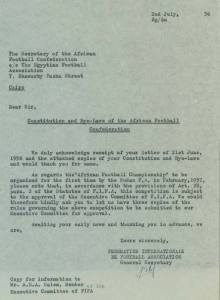This is a guest post by Yussif Abuharaz, an undergraduate student at Michigan State University.
I come from a thriving Muslim community in Flint, Michigan, made up of more than 100 families from many different cultural and ethnic backgrounds. My dad is originally from Omdurman, Sudan, and my mom is from Manchester, England, so both grew up in cities passionate for their football (soccer)!
Most kids in our community receive their education at The Flint Islamic Center and its community has served as my ‘home’ since I was born. Our community has a wealth of football talent and this was seen early on by Talal Khoulani. Talal, who was born in Germany and moved to America as a baby, is of Syrian descent. In 1999, Talal founded FOB soccer, which got its name from the tongue-in-cheek expression “Fresh off the Boat”. It started off as a small team that took part in the local six-a-side indoor league. It quickly grew into a recognizable and established football “mini” club that has fostered some phenomenal players. FOB is widely recognized in Flint’s Genesee County and has a reputation as a respectable organization in the Michigan soccer community.
As a Flint-born Sudanese-American, my life has revolved around football and for this I am very grateful to FOB. It has provided me with countless opportunities and experiences that I will always value. FOB has brought together our community of recent immigrants and established Michiganders. I have made good friendships and enjoyed playing with some amazing players and lots of people from different backgrounds.
Although little known outside our small Flint community, FOB has produced some fantastic players that have gone on to play NCAA soccer at Division 1 and 2 level and one of us just signed a professional contract in the MLS/USL. The centerpieces of FOB are a highly competitive men’s league and one of the biggest and most prestigious 3v3 holiday tournaments in the region: the FOB Turkey Shootout. Those of us in the community look forward to this event all year: it’s always one of the best times of the year. The teams are a mix of semi-pro, D1/D2 college athletes, and some very talented young players.
FOB is a fine example of the kind of grassroots soccer that exists in the U.S. but rarely gets media coverage. In an attempt to draw attention to the accomplishments of the program, here is a list of the Top Ten players to ever wear the FOB jersey.
 1. Issa Rayyan
1. Issa Rayyan
Rayyan is a Jordanian-American born in Dearborn, Michigan, and is probabably a clear-cut number 1 choice. He recently signed his first professional contract with Bethlehem Steel, Philadelphia Union’s USL team, after completing a year at Duke University and playing for Union’s academy team for several years. A lightning-quick player of exceptional technical ability and a very high soccer IQ, Rayyan has been involved with FOB Soccer from a very young age. He regularly participates in FOB Men’s league and the famous Thanksgiving Turkey Shootout tournament, putting in some of the most memorable performances to go along with a Men’s league championship and a Turkey shootout finals appearance.
2. Yamann Sahlool
An American-born Syrian, Sahlool grew up with FOB and has contributed significantly to its growth. Receiving high-level training and playing on two Michigan academy teams in his teenage years, Sahlool developed into a rising prodigy. A combination of terrific finishing skills, strong on-the-ball ability, and sensational off-the-ball awareness led to him scoring bunches of goals and having dominant performances etched in FOB history. Ruthless in front of goal, Sahlool won a Turkey shootout championship and went on to play at the University of Michigan for four years.
3. Khaled Zaki
Born in Egypt, Zaki is one of FOB’s most exciting players. He has showcased some of the best performances in both the Turkey Shootout and the men’s league. Grace on the ball and quick feet are at the root of his exceptional skills that make him one of the toughest players to contain. Zaki is a multiple-time leading goal scorer in the men’s league, multiple-time All-FOB first team, winner of the best offensive player award, and a Turkey Shootout champion. Yet another player who personifies what FOB is all about.
4. Belal Khoulani
Khoulani’s older brother started FOB and he is been part of the program since he started playing. A Syrian-American born in Arkansas and raised in Flint, he is an extremely well-balanced all-around player with an outstanding work rate and soccer IQ, Khoulani can play in a number of different positions: he makes great runs in defense, leads the attack, and truly shines in the midfield. Having the ability to affect the game in several ways is Khoulani’s unique trait. He controls the pace and tempo of the match while staying tactically disciplined in whatever position he’s in. Khoulani currently plays Division 1 soccer at the University of Wisconsin-Green Bay, after several years at the Vardar academy. He is a three-time men’s league Champion and assist leader, Turkey Shootout champion, and first team All-FOB.
 5. Ali Mukhtar
5. Ali Mukhtar
Mukhtar is regarded as one of the most exciting players to ever come through FOB. He is a Sudanese-American born in Flint, raised in Mississippi, who then moved back to Flint in middle school. A dazzling footballer who can use both feet equally well and has the ability to make any defender look silly. An extremely smooth and graceful player, he combines devastating pace and quickness with solid strength on the ball. Mukhtar is also a clinical finisher. He has played FOB since elementary school. Mukhtar is a three-time men’s league champion and leading scorer, Turkey Shootout champion, First Team All-FOB, and a four-time league MVP.
6. Kareem Shukairy
Shukairy is a Syrian-American raised in Flint. The Shukairy family is one of the biggest families in the local Muslim community which FOB anchors. A “Rolls Royce”-style player, Shukairy is smooth, poised, and elegant on the ball. A highly intelligent player who seems to always have his way on the field, he possesses high quality shooting and dribbling technique and is one of the smartest players on the field. Shukairy is a regular in Turkey Shootouts, men’s league, and college league. He is a Turkey Shootout champion and two-time First Team All-FOB.
7. Mohammad Mohammad
An Iraqi-American, Mohammad is an electric player with great pace. A versatile player who can play in the back line and on the wings, it is clear to see why he is so highly valued. Mohammad has been a part of FOB for many years and is regarded as one of the original FOB players. He is a men’s league champion and Second Team All-FOB.
8. Omer Saeed
A gifted and intelligent player, Saeed is seen as probably one of FOB’s most influential players. He is one of the many who were born and raised in Flint with a Sudanese background. He has the ability to completely dominate a game from the middle of the park and can be a match winner on any given day. Saeed is one of the smartest and most technically gifted midfielders, skipping past opponents with ease and picking out the perfect pass better than anyone. Saeed regularly tops the assist charts and continuously makes big plays. He is a two-time men’s league champion, All-FOB First team, four-time men’s league assist leader, and a men’s league MVP.
9. Yussif Abuharaz
According to Talal Khoulani, Abuharaz is the sort of the player that may go under the radar, but is a jack-of-all trades. He can put in solid shifts in defense, midfield, and attack. He placed in and around the top 5 in goals and assists almost every season. Abuharaz is exceptionally technical and a very good passer of the ball. His understanding of the game is up there with the best and he is willing to do all the dirty work in the midfield to help his team. His smooth, yet gritty style of play can be both easy on the eye and highly effective. Abuharaz has played for FOB since he was in middle school and is a two-time men’s league champion and a Turkey Shootout champion.
10. Sammy Saeed
Younger brother of Omer Saeed, Sammy is also a Sudanese-American from Flint. A speedy player of extraordinary fitness and athleticism, Saeed can be an effective and versatile player. At his best as a winger, he can also step in to play in the back line and make an impact on the game even as a forward. Saeed is regarded as a work horse who covers plenty of ground. He defends exceptionally well while being a box-to-box threat who can pop up with goals and assists. Saeed is also technically gifted and capable of breezing passed any defender who stands in his way. He is a two-time men’s league champion and two-time Turkey shootout runner up.
* * *
Soccer in the United States is growing rapidly. Despite its popularity, there are still major improvements needed. I believe more emphasis should be placed on individual player development and changing recruitment patterns. Small organizations and clubs can play a key role as they implement grassroots football values and styles that are critical for the game. FOB has done so for me and the Flint immigrant community that I have been lucky enough to call my own. Not only has FOB crafted me and many others into quality footballers that absolutely love the game, it has also served as a means of bringing people from many different cultures and ethnicities into one big family that, still to this day, take to the pitch as brothers above all else.
Tag: Sudan

The 2015 African Nations Cup begins on January 17 in Equatorial Guinea. The oil-rich dictatorship, a former Spanish colony with a population of 736,000, agreed to host the tournament on short notice after Morocco pulled out due to fears related to the Ebola outbreak in West Africa.
Africa’s most important tournament is organized by the Confederation of African Football (CAF), a trailblazing pan-Africanist institution born at the dawn of the era of decolonization. Joining the world body, as I’ve written elsewhere, was an honorable, quick, and inexpensive way for newly independent nations to assert their full membership in the international community.
CAF took tangible shape at the 1956 FIFA Congress in Lisbon. There, delegates from Egypt, Sudan, and South Africa convened to draft a constitution and by-laws. The men also decided to organize a continental championship. Ethiopia was also involved in the discussions, but Yidnecatchew Tessema was unable to travel to Lisbon. The African proposal was later sent to FIFA for review and approval (see image at left).
On February 8, 1957, football officials from Sudan, Egypt, Ethiopia, and South Africa convened at Khartoum’s Grand Hotel to formally launch CAF. Fred Fell, a white man representing apartheid South Africa, was invited because his country was a member of FIFA and the Africans did not wish to be perceived as undiplomatic. In the meantime, the white South African football association gingerly debated the composition of the national team. However, the authorities Pretoria opposed a mixed selection and the white football establishment did not challenge the policy.
There are conflicting accounts about what happened next. CAF officials stated that they promptly excluded South Africa in a show of unequivocal pan-African solidarity. Fell and white South African football put forward a different story: they claimed they withdrew the team prior to any sanctions due to the team’s impending tour to Europe as well as security concerns linked to the ongoing Suez Crisis. Unfortunately, the minutes of the meeting at CAF were later destroyed in a fire so we may never know the exact truth of the matter. What is certain is that the South African issue did not disappear. To the contrary, the struggle against apartheid in football would become a powerful bond that united CAF and nearly all African nations for three decades.
South Africa’s absence in 1957 meant that only three teams, comprised of amateurs, participated in the inaugural African Nations Cup. Ethiopia, which had been drawn to play against South Africa, received a bye into the final. Egypt defeated hosts Sudan 2–1 and then dispatched Ethiopia 4–0 in the final watched by a crowd of 30,000 at the Stade Municipal. All four goals were scored by striker Mohammed Diab El-Attar “Ad Diba.” “Those were unforgettable matches,” Ad Diba recalled in an interview in 2001. “The success of this championship and its popularity amongst the Sudanese encouraged the African federation to organize a tournament on a biennial basis and to be played in a different country each time,” he said. Ad Diba made history again eleven years later in Addis Ababa, when he refereed the Afcon final between Congo (DRC) and Ghana (see video).
In those early days, CAF brought to life Kwame Nkrumah’s dream of a United States of Africa. At the same time, football provided a rare form of national culture, unity, and pride in postcolonial Africa.
Today, the African Nations Cup has transformed itself into a globalized commercial event with multinational corporate sponsors, matches on satellite television and online, many European coaches, and most players on the sixteen squads employed by European clubs. It is a far cry from 1957. And yet an alluring contradiction has endured: the Afcon showcases Pan-African solidarity while triggering 90-minute nationalism.